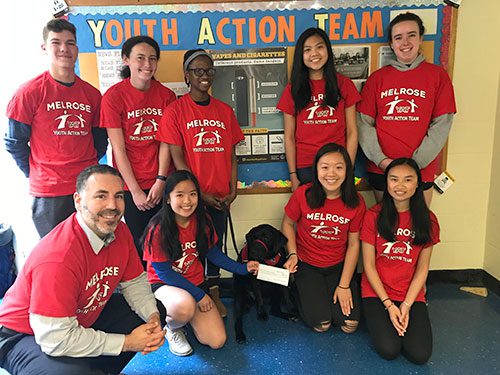Published October 11, 2019
By GAIL LOWE
MELROSE — When the stresses of life threaten to overwhelm, students at Melrose High School can take comfort in Tinker, a two-and-a-half-year-old female black Labrador Retriever.
Tinker is a trained assistance dog, and it is her job to be a supporting, loving member of the school, according to Guidance Counselor Jeff Bolduc, co-advisor of the Youth Action Team, a school-based club that works with the Melrose Substance Abuse Prevention Coalition. The organization’s purpose is to provide information and help students make healthy decisions concerning nicotine, alcohol and drugs. Bolduc works closely with Robert Savarino, STOP grant youth coordinator, and lives in Melrose with Tinker, his wife, three children, another dog named Sammy and Lucky, a cat.
Currently, there are 17 cities and towns in Massachusetts that have assistance dogs in schools, including Boston, Burlington and Framingham.
After applying to the National Education for Assistance Dog Services (NEADS) to become an assistance dog handler, Bolduc was pleased to learn that he was accepted. To remain current, he must now be recertified annually through Assistance Dog International. He pays for all of Tinker’s expenses, including food and veterinarian bills.
Established 40 years ago, NEADS trains dogs like Tinker from puppyhood to about 18 to 24 months old. While in NEADS’s care, the animals are placed in one of nine correctional facilities Monday through Friday. The inmates in the program then undergo training to provide 24 hours of care for the dogs.

MELROSE HIGH SCHOOL GUIDANCE COUNSELOR JEFF BOLDUC, in the front row at left, arranged for assistance dog Tinker to become a “staff member” and provider of emotional support to students at the school. Next to Bolduc, from left: Emily Chow, Tinker, Amber Chow and Sanny Yu. In the back row, from left: Matthew Whelan, Brigid McCarron, Judelee Noel, Janice Tang and Sabrina Gardner. (Courtesy Photo)
“The program is not only economically beneficial but a true rehabilitation program for the inmates,” said Bolduc.
On weekends, the dogs are placed with a volunteer family that trains and acclimates them to social situations inside places like restaurants and shopping malls. The final goal is for the dog to become a service dog for someone with a disability, such as a vision or hearing impairment or confinement to a wheel chair.
Some dogs, like Tinker, are a little too social and are better suited for a school or hospital setting.
While working with students over the years, both Bolduc and Savarino have seen a greater need for social emotional support in an educational setting. Extensively trained dogs such as Tinker can be a companion for students who suffer from anxiety, depression, school phobia and communication difficulties.
“We’ve noticed that when a student’s social emotional needs are taken into consideration, the likelihood of that student accessing the curriculum is greater,” said Bolduc. “Also, we’re preparing these students to become compassionate, loving and contributing members of our community. This starts with feeling safe and supported in the school setting.”
Bolduc said he first thought about obtaining an assistance dog when, 18 years ago, he visited a disabled family member who lives in a medical facility where an assistance dog was working with the patients. Since he had always been a dog lover, he was naturally drawn to the idea of a dog helping those in need.
Bolduc said he never really thought an assistance dog was an option for a school until the topic came up in conversation with a co-worker and Educational Team Facilitator Jennifer Chernisky listened in.
“Jennifer thought having an assistance dog at the school would be a great idea, and soon an investigation into the possibility got underway,” Bolduc said.
Today, he and Tinker come to work and head straight for Bolduc’s office before greeting students as they enter the building. Some students arrive at Bolduc’s office to fill Tinker’s water bowl or give her coat a quick brush.
“As a guidance counselor, I meet with students in my office throughout the day, and Tinker is there with me. We take many trips around the school and into classrooms and interact with as many students as possible.”
The response for having Tinker “on staff” has been nothing but positive, said Bolduc. “The smiles on everyone’s face says it all.”
He added that it is easy to forget all the stress in life — even for a quick second — when Tinker comes to call.
Teachers often request a visit when a big test is looming to lighten the mood. If a crisis occurs, the pair might be called to work with a student or group of students who might need extra support.
“Tinker is not your typical black Lab. She is very laid back and will not run or jump on a person. If a student is allergic or feels uncomfortable around dogs, she knows to keep her distance.”
It costs NEADS over $45,000 to train a dog, start to finish. NEADS asks handlers to raise $8,000 to help with costs and allows two years for the funds to be raised. At present, Bolduc has raised a little more than $5,000. Contributions are graciously accepted at https://support/neads.org/JeffBolduc.




